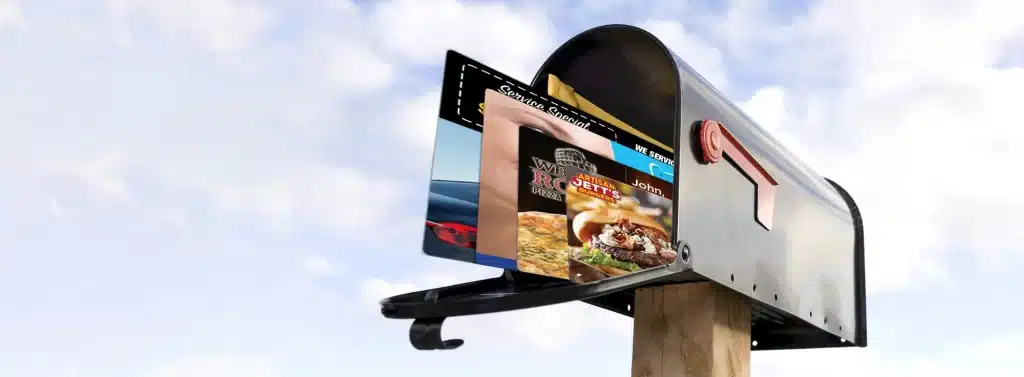Businesses today face the challenge of balancing effective marketing with sustainability, especially as environmentally conscious consumers demand greener practices. One solution gaining momentum is biodegradable direct mail, particularly direct mail postcards. These eco-friendly tools minimize environmental impact while still maximizing redemption rates and ROI. Direct mail has long been a trusted method in direct mail marketing, offering a tangible way to connect with people that digital channels often can’t replicate. However, traditional direct mail campaigns can generate waste, clashing with the values of those who prioritize environmental impact, while still missing the mark on redemption rates and ROI. Using biodegradable materials allows businesses to maintain the benefits of direct mail while reducing their ecological footprint. It offers a compelling blend of practicality and responsibility.
A standout option in direct mail is the landfill biodegradable laminated plastic card, such as those tested to ASTM D5511-18 and ISO 17025:2017 standards, breaking down naturally in landfill conditions and leaving behind no toxic residues. Designed to mimic the look and feel of a gift card, these postcards feature a wallet-friendly, pop-out coupon that drives ultra-high redemption rates. Their durability ensures they withstand the mail stream and mailbox elements, arriving in top condition. This combination of convenience, resilience, and eco-friendliness makes them an ideal choice for direct mail campaigns looking to stand out and deliver results.
The Enduring Appeal of Direct Mail
 Direct mail remains a powerful way to engage a target audience. Unlike fleeting online ads, direct mail lands physically in people’s hands, fostering a personal connection. Research shows direct mail campaigns often outperform digital efforts in response rates, making direct mail marketing a go-to for businesses. When paired with eco-friendly practices, direct mail becomes even more attractive to environmentally conscious consumers who value brands that align with their principles.
Direct mail remains a powerful way to engage a target audience. Unlike fleeting online ads, direct mail lands physically in people’s hands, fostering a personal connection. Research shows direct mail campaigns often outperform digital efforts in response rates, making direct mail marketing a go-to for businesses. When paired with eco-friendly practices, direct mail becomes even more attractive to environmentally conscious consumers who value brands that align with their principles.
For local businesses, direct mail is a lifeline to their community. Whether it’s a retailer targeting existing customers with a discount or a service provider reaching new customers nearby, direct mail campaigns can be customized to fit specific goals. The key is a marketing strategy that maximizes direct mail’s strengths while embracing sustainability. Biodegradable direct mail postcards, for instance, allow businesses to reduce waste and appeal to more customers who appreciate eco-friendly efforts.
By using green materials in direct mail marketing, such as NVIO™ Card, companies can enhance their reputation and tap into a growing market of eco-minded individuals. A local bakery, for example, could send direct mail postcards to promote a new pastry, reaching both new customers and loyal patrons with a custom design that highlights their environmental commitment.
The Unique Advantages of Bio-Laminated Direct Mail Postcards

Durability sets these postcards apart too. Built to endure rain, wind, and rough handling in the mail stream, they arrive looking pristine, unlike flimsy traditional postcards. This reliability enhances their appeal for local businesses running direct mail campaigns, projecting professionalism to their target audience. The high ROI of these direct mail postcards makes them an effective marketing tool for driving immediate action and long-term loyalty.
Their environmental impact is a major plus. Made from biodegradable materials, these postcards break down naturally. Businesses can execute direct mail marketing with confidence, knowing they’re reducing waste while connecting with more customers. This balance of practicality and sustainability is why bio-laminated direct mail postcards are transforming how companies approach direct mail.
Building Successful Direct Mail Campaigns

Timing matters in direct mail marketing too. Sending direct mail during peak seasons or local events can amplify its impact. A boutique might use high-redemption rate postcards to announce a sale, targeting new customers and regulars alike. The durability of bio-laminated postcards ensures they hold up, even if delayed in a mailbox, making them a reliable choice for direct mail campaigns.
Direct mail’s flexibility suits businesses of all sizes. Whether a small shop wants to increase revenue or a larger firm aims to expand its customer base, direct mail marketing can scale accordingly. Choosing sustainable direct mail options like bio-laminated postcards enhances the effort, appealing to environmentally conscious consumers while delivering measurable results.
Tracking Results and Growing Your Customer Base

For local businesses, direct mail stands out in crowded markets. A well-crafted campaign can turn new customers into regulars and keep existing customers engaged. The eco-friendly edge of sustainable direct mail appeals to those who weigh environmental impact in their choices, fostering a loyal customer base over time. A pet store, for instance, could send direct mail postcards with a discount coupon, drawing in new customers while reinforcing their green values.
The Future of Direct Mail Marketing

For local businesses and beyond, direct mail campaigns rooted in sustainability are a smart move. They cater to environmentally conscious consumers, deliver results, and offer a creative way to reach a target audience. Whether you’re growing your customer base, engaging existing customers, or testing a new marketing strategy, sustainable direct mail deserves a spot in your toolkit. With bio-laminated direct mail postcards, you can achieve the high ROI direct mail is known for while contributing to a greener future.
In summary, bio-laminated direct mail postcards blend convenience, durability, and environmental responsibility into a powerful and sustainable direct mail package. Integrating them into your direct mail campaigns can attract new customers, retain existing ones, and make a positive impact, all while driving the results your business needs. It’s a practical, effective way to enhance your marketing strategy and connect with more customers meaningfully.

